Milei's election has certainly made libertarianism, anarcho-capitalism, and the Austrian School of Economics widely known.
By Maxwell, Golden Finance
Three years ago, few could have predicted that the television commentator and advocate for free will, the Austrian School of Economics, and anarcho-capitalism, Javier Milei, would become the President of Argentina in three years.
After two rounds of elections, Javier Milei defeated his opponent, the Peronist Argentine Minister of Economy, Sergio Massa, on November 20, 2023, to win the Argentine presidential election.

Argentina's second round of presidential election results Source: Bloomberg
Why was Milei able to be elected?
To understand why Milei was able to be elected as the President of Argentina, one only needs to look at the exchange rate of the Argentine peso over the past twenty years. The official exchange rate is 350 pesos to 1 US dollar, but the black market rate is as high as 900 pesos.
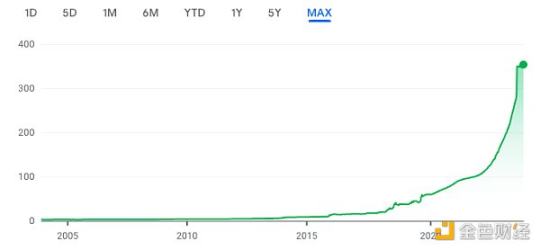
Source: Google Finance
Furthermore, looking at Argentina's inflation rate since 1960, it is clear that Argentina is an extremely abnormal country, with its currency experiencing prolonged periods of high inflation.
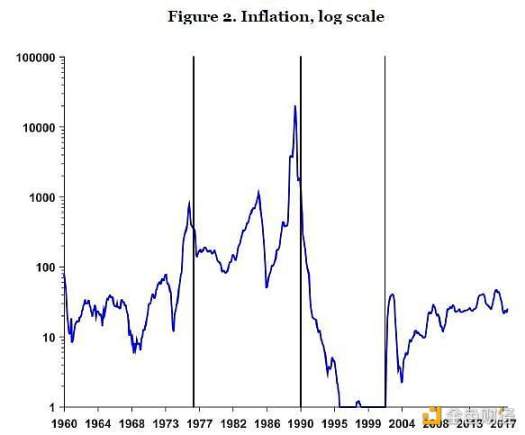
Source: The Case of Argentina
Prior to 1990, inflation was consistently over 100%, with rates exceeding 1000% in 1974 and 1985, and reaching 20,000% in 1989. From 1994 to 2001, due to the pegging of the Argentine peso to the US dollar, inflation rates temporarily dropped to single digits, but began to rise again in 2001. In 2012, inflation rates soared from 20% to over 50%, and by 2019, the inflation rate had reached over 50%. The latest data from 2023 shows that the inflation rate of the Argentine peso is as high as 143% and still rising.
From the above data, one can intuitively understand how Argentina has become the only negative example of a "fall from a developed country to a developing country" in the world. There is not only a "middle-income trap," but also a "developed country trap." Argentina is an example of the "developed country trap."
Despite the sympathy and praise garnered by the Peronist First Lady through Madonna's song "Don't Cry For Me Argentina," Peronism is the main reason for the tears of the Argentine people. Peronism advocates for big government, central planning, increased regulation, support for labor unions, social welfare, and the exclusion of foreign investment. Since World War II, Argentina has been governed by Peronist governments, and even with changes in political parties, the degree of Peronism has remained consistent.
Therefore, three generations of Argentines have lived in high inflation and have had enough. The people of Argentina want change. Many believe that Milei is their best choice.
As 28-year-old voter Ayrton Ortiz said at a rally before Milei's election, "Milei is the change Argentina needs."
Despite Milei's opposition to abortion, female voters still chose to support him. A female voter interviewed by Agence France-Presse said, "We want to see new faces, I bet on change, I bet on Milei."
Who is Milei? What is his true nature?
What kind of person is Milei? One can glean some understanding from the various labels associated with him.
Birth: Born in Buenos Aires in October 1970, his mother was a homemaker and his father was a bus driver.
Singer: In his youth, he was the lead singer of the cover band Everest, which mainly covered songs by The Rolling Stones.
Athlete: In his youth and early adulthood, he was a goalkeeper for Chacarita Juniors until 1989.
Economics student: Milei entered Belgrano University in 1989 and obtained a degree in economics. He later obtained two master's degrees from the Institute for Economic and Social Development (IDES) and Torcuato di Tella University.
Economist: After graduating from university, Milei served as chief economist for several companies (such as Máxima AFJP, Estudio Broda, Corporación América), senior economist at HSBC Bank Argentina, a member of the B20, economic policy advisor for the G20, a member of the World Economic Forum, and head of the economic research department at the national think tank Fundación Acordar.
Internet celebrity: Before entering politics, Milei was an internet celebrity. According to Ejes' 2018 ranking, Milei was the most interviewed economist on Argentine television, with a total of 235 interviews.
Social media influencer: He registered his personal Twitter account in 2015, currently with 1.6 million followers. He also hosts his own podcast "Demoliendo mitos" (Demolishing Myths) and has 320,000 and 640,000 subscribers on YouTube and Facebook, respectively.
Professor: He has taught macroeconomics, growth economics, and microeconomics at several universities in Argentina and abroad.
Author: He is a prolific writer advocating for freedom and criticizing inflation, having written several economic works.

Source: Goodreads
Finally, he is a politician and the President of Argentina: In 2020, Milei joined Avanza Libertad (Advance Freedom), and in 2021, he founded La Libertad Avanza (Advance Freedom Alliance) and became its leader. He ran for a seat in the Argentine National Chamber of Deputies and was elected as the new President of Argentina in 2023 after two rounds of elections.
Among all these identities, what is the essence of Milei? The author believes that he is fundamentally an Austrian School economist. It was the inspiration from the prolonged experience of inflation that several generations of Argentines have endured that led him to contemplate what the correct economics should be.
In an interview, Milei stated that it was his interest in the currency crash and inflation of the 1980s that led him to become an economist. Especially in the year he turned 18 (1989), during the severe inflation, he decided to quit the football association and formally pursue the study of economics. He later obtained a degree in economics from Belgrano University and two master's degrees from the Institute for Economic and Social Development (IDES) and Torcuato di Tella University.
In 2013, Milei read the famous work "Man, Economy, and State" by the renowned Austrian School economist Murray Rothbard. It was then that Milei began to call himself an anarcho-capitalist.
Milei also considers the well-known Austrian School economist Jesús Huerta de Soto as his intellectual mentor. De Soto is currently a professor at King Juan Carlos University in Spain. Milei has publicly expressed his admiration for De Soto on multiple occasions. Milei was also one of 52 authors who contributed to a collection of essays paying tribute to Professor De Soto. After Milei was elected as the President of Argentina, De Soto stated, "We are now closely advising him, especially on the necessity of establishing a 100% reserve ratio in the dollarization process."
Chainsaw, Dog, and "Radical" Propositions
During Milei's campaign for the presidency of Argentina, traditional media outlets such as Reuters, Bloomberg, and the BBC labeled Milei as "far-right," "populist," "crazy," "Argentina's Trump," "radical," and so on. These labels clearly stem from the traditional media's lack of understanding of the Austrian School of Economics and libertarianism.
"Ideas" shape people. To thoroughly understand a person, the best entry point is the beliefs they adhere to.
Let's first take a look at Milei's various "radical" propositions:
Abolishing the Central Bank of Argentina, reducing government departments (from 20 to 8), replacing the Argentine peso with the US dollar, abolishing labor laws and social welfare, condemning Keynesianism as the root of all evil, supporting the right to bear arms, supporting bodily autonomy (organ trading, legalization of prostitution, etc.), opposing abortion rights, opposing women's rights and LGBT, freezing relations between Argentina and China (but respecting agreements signed by Argentine companies with Chinese companies), praising former UK Prime Minister Thatcher (who initiated the 1982 Falklands War, in which Argentina was defeated), and calling climate change a "socialist hoax," among others.
These so-called "radical" propositions may sound shocking, but for libertarianism and the Austrian School, they are commonplace. Libertarianism advocates for free markets, small government, personal responsibility, sound monetary policy, 100% reserves, voluntary trade, and opposition to welfare, among other things.
Among these, "abolishing the Central Bank of Argentina, reducing government departments, and replacing the Argentine peso with the US dollar" are Milei's core propositions.
For example, Milei's proposition to "shut down the central bank" reminds the author of a memorable moment in the 1920s involving Ludwig von Mises.
In the 1920s, after World War I, Austria experienced severe hyperinflation similar to Germany. The Austrian government was at a loss and sought help from one of the greatest economists of the 20th century, Ludwig von Mises. Mises met with visiting officials at midnight at the government printing office and had a simple solution for them. At 12 o'clock in front of the printing office, Mises told them, "Do you hear the continuous rolling sound of the printing presses next door? Turn them off." The Austrian government followed Mises' advice, tightly controlling the issuance of banknotes, and Austria's severe hyperinflation came to an end, taking a different path from Germany.
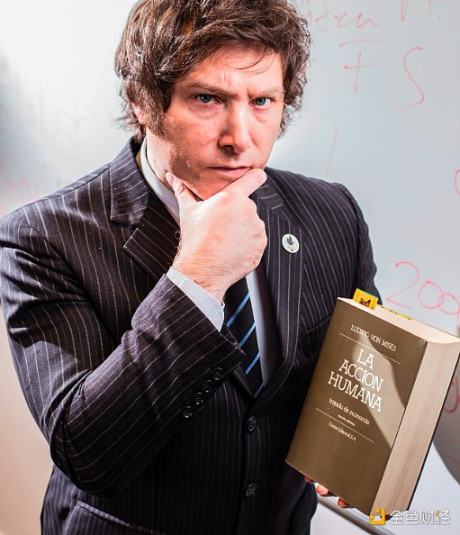
Milei and Mises "Human Action" Spanish edition photo
Coincidentally or perhaps destined, it reminds the author that Mises gave six lectures at the Center for Free Studies in Argentina in 1959, which were later compiled and published as "Economic Policy: Thoughts for Today and Tomorrow." At that time, Mises expressed his hope that in a few years, the number of people supporting the concept of freedom in Argentina and other countries would greatly increase. More than 60 years later, we have witnessed Mises' hope come true.
Milei's second proposition comes from the empirical evidence of Argentina in the 1990s. The Convertibility Plan implemented by President Carlos Menem in the 1990s pegged the peso to the US dollar, effectively ending hyperinflation. The plan was launched on April 1, 1991, and by 1993, Argentina had the lowest inflation rate in the world. Milei has expressed his hope for currency competition and comprehensive reform of the financial system. "The most likely scenario is that Argentines will directly choose the US dollar."
A symbol of Milei's election this time is the "chainsaw," which represents his third proposition. He strongly advocates for reducing government departments. During the Argentine elections, some videos of Milei went viral online, showing him tearing off sticky notes with the names of government departments he intended to cut, and shouting his slogan: "Long live damn freedom!"
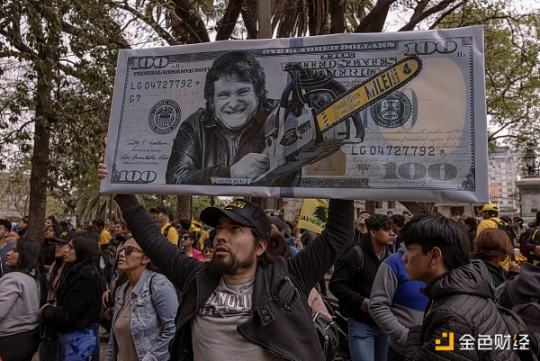
Argentine voters holding symbols representing Milei's two major campaign promises
As mentioned earlier, Milei's essence is that of a libertarian economist. This can also be seen from the five dogs he owns.
Milei has five dogs, named Conan (after the protagonist of the 1980s movie "Conan the Barbarian" starring Arnold Schwarzenegger), Murry (after the Austrian School economist Murray Rothbard), Milton (after the Chicago School economist Milton Friedman), Robert, and Lucas (after the Chicago School economist and Nobel Prize winner in economics, Robert Lucas). Murray Rothbard, Milton Friedman, and Robert Lucas are all renowned economists in the field of business cycle theory, which focuses on inflation and central banks. Murray Rothbard is a leading figure in the revival of libertarianism in the 1970s and 1980s and the pioneer of anarcho-capitalism.
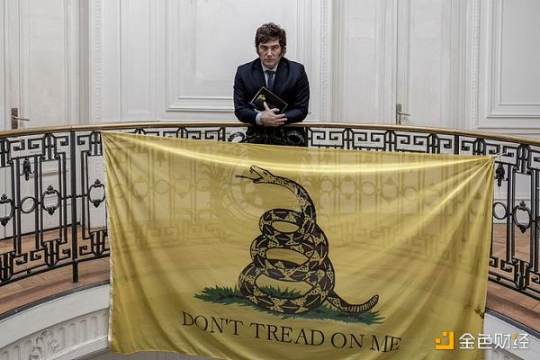
Milei with the flag of libertarianism and the Gadsden flag
Milei supports Bitcoin
As a follower of the Austrian School, Milei's proposition to "abolish the central bank" is clearly understandable. He would undoubtedly support Bitcoin as well.
He has publicly advocated for "central banks being a scam" and "support for Bitcoin" on multiple occasions, although Milei has not yet proposed using Bitcoin as legal tender or as a national reserve asset.
He stated that central banks are a scam, a mechanism through which politicians deceive the people with inflation taxes. Legal tender issued by central banks allows politicians to deceive the people with inflation taxes. Bitcoin is a natural response to the scam of central banks, representing the return of currency to its original creators, the "private sector." Bitcoin's algorithm determines that it will stop being issued after reaching a certain quantity.
Milei stated that in economies with high inflation rates, the scam issue is more severe, which is why he proposes shutting down central banks.
Will Bitcoin become legal tender in Argentina?
Although Milei has publicly supported Bitcoin on multiple occasions, will Argentina make Bitcoin legal tender like El Salvador?
El Salvador's ability to pass the "Bitcoin Law" in 2021 and become the first country to make Bitcoin legal tender is related to its unique national situation. El Salvador is located in Central America, close to the United States, and its citizens have long relied on remittances in US dollars, leading to a heavily dollarized economy.
Since January 1, 2001, the Central Bank of El Salvador has stopped issuing its own currency, the colón, but it can still circulate. The US dollar has been the de facto legal tender since then. This means that El Salvador has not had its own independent monetary system since 2001. Therefore, when El Salvador made Bitcoin legal tender alongside the US dollar in 2021, there was little political resistance and minimal impact on the economy.
Unlike El Salvador, the Argentine economy does not have the same US dollar foundation. Additionally, although Milei successfully won the presidency of Argentina, his political base is weak. The Advance Freedom Alliance, led by Milei, was only established in 2021 and currently holds only 8 out of 72 seats in the Argentine Senate and less than 40 out of 257 seats in the Chamber of Deputies. The party also does not have any governors in the 23 provinces of Argentina.
This means that even based on Milei's ideas, he would face significant resistance in parliament if he strongly supports an "Bitcoin Law" specific to Argentina.
Unless Milei can achieve significant economic accomplishments in the short term, gain high political prestige, and garner public support.
Conclusion
In any case, the people of Argentina ultimately chose Milei, a libertarian and Austrian School economist, as their president.
Perhaps the people of Argentina do not necessarily support Milei's "radical" propositions, but they have simply had enough of hyperinflation and Peronism in their nearly century-long history of decline. Perhaps the mindset of the people of Argentina is: "We've hit rock bottom, so the only way to go is up."
Because for ordinary people, as long as they can live a decent life, they do not care about "libertarianism," "anarcho-capitalism," or the "Austrian School."
But Milei's election has certainly made libertarianism and the Austrian School of Economics widely known. Just as the emergence of Bitcoin has popularized the Austrian School of Economics.
Hopefully, these ideas can take root in Argentina and become mainstream, and the people of Argentina will no longer cry.
免责声明:本文章仅代表作者个人观点,不代表本平台的立场和观点。本文章仅供信息分享,不构成对任何人的任何投资建议。用户与作者之间的任何争议,与本平台无关。如网页中刊载的文章或图片涉及侵权,请提供相关的权利证明和身份证明发送邮件到support@aicoin.com,本平台相关工作人员将会进行核查。




